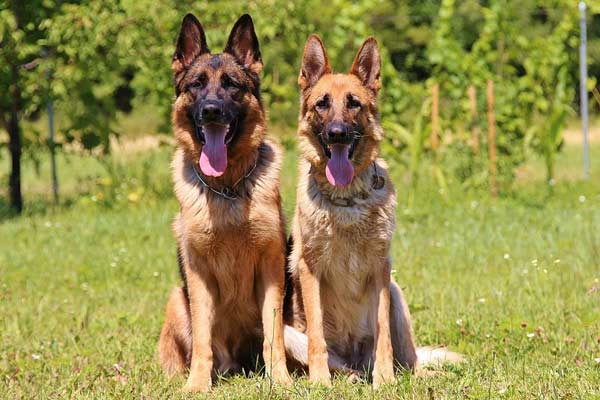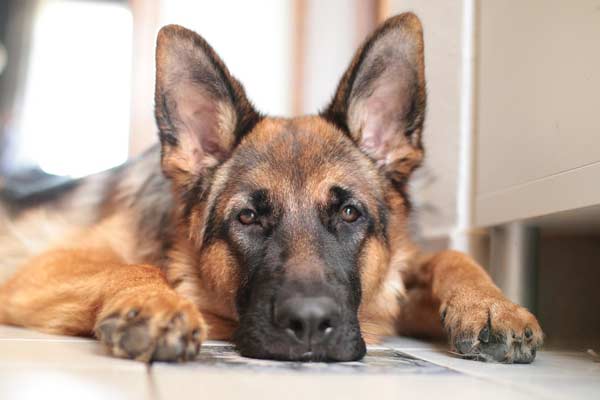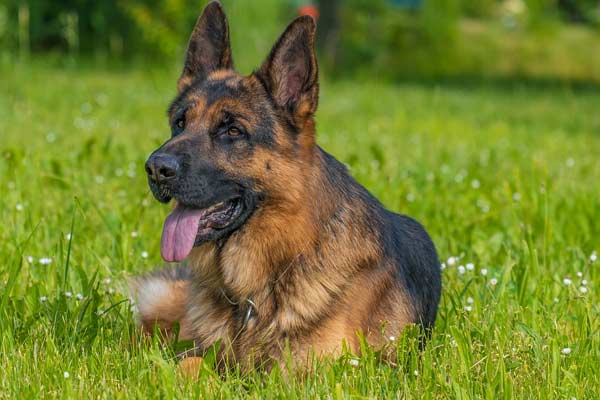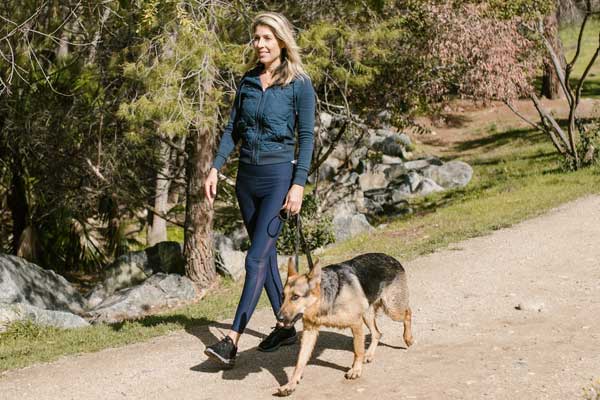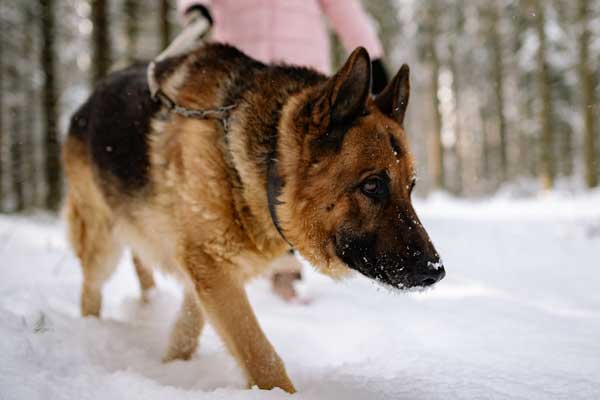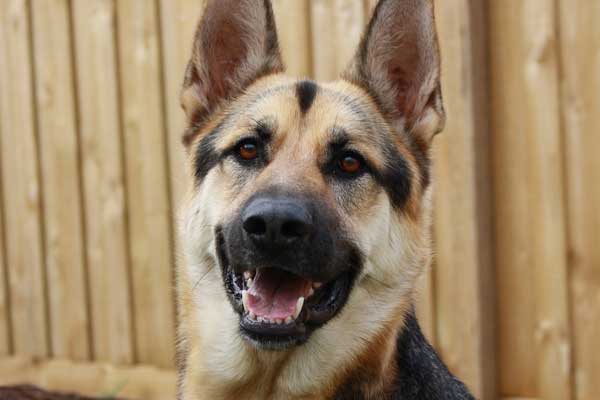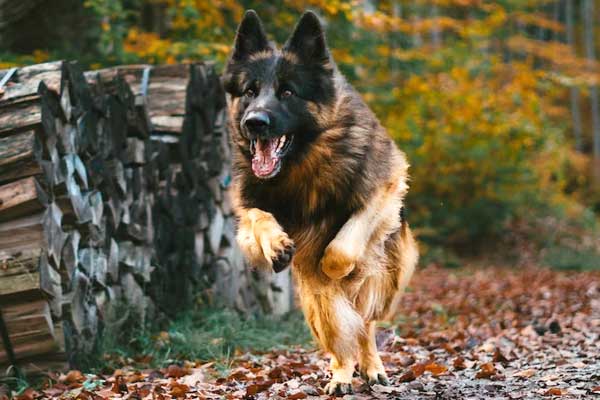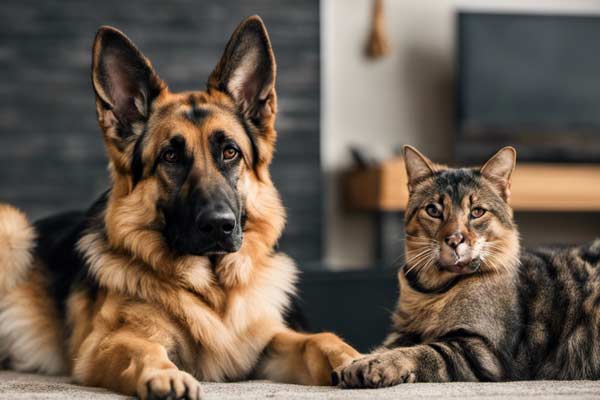How Often Do German Shepherd Poop? Real Advice from Dog Owners
German Shepherds are popular dog breeds in the world. They are incredibly loyal and intelligent and make great family companions.
But if you’re new to owning a German Shepherd, one question you may have is how often they need to go potty.
The answer to this question depends on age, diet, and activity level.
In this article, we’ll discuss all of these topics so that you can ensure your German Shepherd is pooping appropriately and staying healthy!
Additionally, it’s important to note that any changes in your pup’s bathroom habits could signal an underlying health issue.
How Often Do German Shepherds Poop?
German Shepherds are known to be quite regular in their bathroom routine, usually pooping between one and five times daily.
However, the exact frequency of their bowel movements can vary depending on several factors, such as age, diet, health conditions, and other environmental factors.
For example, if your German Shepherd is eating rich or fatty foods, their poop frequency may increase.
On the other hand, if they suffer from a medical condition such as diarrhea or constipation, then the number of times they go to the bathroom will decrease significantly.
Factors That Affect How Often a German Shepherd Puppy Poops
The frequency of a German Shepherd puppy’s bowel movements can vary greatly depending on several factors.
The puppy’s age, what it eats, and any digestive disorders it may have are all potential influences on the frequency of its pooping habits.
Puppies tend to poop more frequently than adult dogs. This is because their digestive systems are not as developed, and their bodies are still growing. As a general rule, puppies should be pooping at least once per day or more often.
The food a puppy eats can also be an essential factor in how often they poop. A highly processed dog food diet can lead to frequent poops, while a diet of natural, whole ingredients can lead to less frequent pooping.
If the puppy has digestive disorders such as diarrhea or constipation, it can also affect how often it goes to the bathroom. If your German Shepherd puppy has digestive system issues, it’s best to consult a veterinarian.
How Long Can German Shepherds Go Without Pooping?
The answer is that it depends on the dog’s diet and health. Generally speaking, if your German Shepherd hasn’t pooped in 24 hours, you shouldn’t be worried yet.
However, if he goes more than 48 hours without pooping, this could indicate constipation due to dehydration or other medical issues such as an intestinal blockage or infection.
It’s essential to monitor your pet closely and contact a veterinarian if you notice any signs of distress, such as vomiting or lethargy, along with not defecating for too long.
In addition to ensuring your German Shepherd gets enough exercise and fresh water daily, feeding him high-quality food that contains plenty of fiber may help keep his digestive system running smoothly so he doesn’t become constipated.
If necessary, you should also consider adding supplements such as probiotics which can aid digestion and promote regular bowel movements in dogs.
What If Your German Shepherd Has Diarrhea Or Constipation?
Diarrhea and constipation are two common digestive issues in German Shepherds. While both can be unpleasant for your pup, it’s essential to recognize the signs so that you can provide prompt treatment and help ensure a speedy recovery.
Diarrhea is characterized by frequent loose or watery stools, while constipation involves infrequent dry stools that are difficult to pass.
If your German Shepherd is experiencing either of these conditions, there are several things you should do to help them feel better quickly.
First, you should reduce their food intake to allow your pup’s digestive system to rest. Additionally, sticking to simple foods like boiled chicken and white rice can help by providing easily digestible nutrients without stressful additives.
You should also ensure your German Shepherd drinks plenty of water throughout the day, as dehydration can worsen symptoms.
If your pup still has difficulty passing stool, adding a teaspoon of pure pumpkin to their food may help relieve it.
Finally, if the condition persists for more than 24 hours or you notice other worrisome symptoms like vomiting or excessive lethargy, it’s time to contact your veterinarian for medical care.
You do not want to see your German Shepherd suffer from constipation, but it can happen. Knowing the signs of constipation and what to do about it can help keep your pet healthy and comfortable.
In dogs, constipation usually occurs when a disruption in their diet or lifestyle results in digestive problems. Common signs include straining during bowel movements, hard stools, vomiting, loss of appetite, and lethargy.
If left untreated, constipation can lead to more severe health issues, such as dehydration and electrolyte imbalances.
Fortunately, there are steps you can take to treat constipation in your German Shepherd at home before seeking medical attention from a veterinarian.
Increasing your pup’s water intake and adding more fiber-rich foods to their diet, such as pumpkin, can help keep them regular.
Consider adding a supplement like slippery elm or aloe vera juice to their meals, which can aid digestion.
If these home remedies don’t do the trick, it may be time to consult your vet. They may recommend several treatments depending on the severity of constipation, including laxatives, increased exercise, and even surgery in more severe cases.
What Should My German Shepherd Poop Look Like?
It should be brown, solid but squishy, in one log-like piece, and sized proportionately to your dog’s food.
The appearance of your German Shepherd’s poop can tell you a lot about their health and diet. It should be brown, solid but slightly squishy, in one log-like piece, and proportionate to your dog’s food.
If it looks different or has an unusual smell or color, you should visit the veterinarian for a checkup as soon as possible. Additionally, dogs with certain medical conditions may have poops that look different than usual.
If your German Shepherd’s poop is too soft, it may signify that they need more fiber in their diet to help firm up their stool.
Make sure you feed them high-quality dog food with appropriate protein and carbohydrates. If your German Shepherd’s poop is still very soft or watery after adding more fiber, it may indicate an underlying medical issue.
It’s also essential to ensure that your German Shepherd has access to plenty of water, which will help keep their stools regular and healthy.
What Color Should My German Shepherd Poop Be?
Brown: A healthy pup’s bowel movements should be chocolate brown.
Black or maroon: This could signify stomach or slight intestinal bleeding.
The green stool could indicate your dog is eating grass to soothe an upset stomach.
Yellow: Yellow poop can occur if your pup has a mild bacterial infection or intestinal parasites. It may also result from improper digestion, such as eating too quickly or consuming something they shouldn’t have.
The white stool could be a sign of pancreatic problems, including pancreatitis. It could also indicate a vitamin deficiency and a lack of bile production.
Red: This could mean that your pup has blood in their stool due to several causes, such as internal bleeding or an infection. It’s essential to bring them to the vet if you notice red-colored poop.
If the color of your German Shepherd’s poop is significantly different than usual, it could indicate a health concern.
Paying close attention to the color of their feces can help you identify potential problems early and ensure your pup gets the care they need.
Best Diet for German Shepherds
A healthy diet for a German Shepherd should be rich in protein and fat content, such as chicken, beef, turkey, lamb, salmon, and rabbit.
In addition to providing essential nutrients like proteins and fats that help fuel your pup’s activity level throughout the day, these foods also contain vitamins and minerals that support overall health.
Feeding your German Shepherd a balanced diet can help keep them fit and strong while preventing any nutrition-related diseases or illnesses.
Paying attention to the quality of food you feed your German Shepherd is also essential. Choose foods specially formulated for large breeds and active dogs, with moderate fat content and added vitamins and minerals.
It would be better to look for high-quality ingredients, like real meat, as the first ingredient. Avoid fillers like corn, wheat, or other grains that can be hard to digest and provide no nutritional value. And make sure to always keep your pup hydrated with plenty of fresh, clean water.
Tips for Training Your German Shepherd Puppy on Potty Habits
1. Establish a Regular Routine: Setting your phone’s alarm to remind you to take your puppy outside regularly (every 2-3 hours) is an effective way of preventing accidents and helping your pup learn better potty habits.
Try to be consistent with the timing as much as possible. In addition, establish an area outside where you take your puppy each time. This helps them learn that going to this designated spot is for pottying and will help them understand the concept better over time.
2. Reward Your Puppy: Positive reinforcement is critical in teaching good potty habits. Whenever your puppy goes outside to do his business, reward him with a treat and lots of verbal praise. This way, they’ll know that they’re doing something right.
3. Be Patient: Training your puppy on potty habits takes time, patience, and consistency. It will take some trial and error to get it right, so be patient with them during the process. With enough patience and consistency, they’ll eventually get it right!
4. Clean Up Accidents Immediately: If you catch your puppy in the act of having an accident inside, use a stern voice to let them know that this type of behavior is unacceptable. Don’t yell or punish them after the fact, as they won’t understand the connection.
Immediately clean up any accidents with an enzymatic cleaner, as this will help remove the smell and ensure they’re less likely to return to that spot in the future.
5. Seek Help: If you’re having trouble training your German Shepherd puppy on potty habits, don’t hesitate to reach out for help. Consider talking to a professional trainer or animal behaviorist for advice and guidance on tackling the issue.
6. Stay Positive: Remember to stay positive throughout the process. A positive attitude will help you and your puppy stay focused on the task at hand and make it easier for both of you to learn good potty habits.


